- This UVic-UCC centre has been running for a decade and is now a benchmark in the field of circular bioeconomy, applied ecology and sustainable agri-food systems
- Today, it has 110 employees, is participating in 45 European projects and has an annual budget of 6 million euros
On 14 November 2014, ten years ago, the BETA Technology Centre (Biodiversity, Ecology, Technology and Environmental Management) of the University of Vic - Central University of Catalonia (UVic-UCC) was founded. Initially located on the ground floor of the Faculty of Science, Technology and Engineering (FCTE), in the Torre dels Frares building on the Vic Campus, and with a staff of four people, it was launched to advance in research undertaken in the environment and sustainability field at the University.
Now, the BETA Technology Centre is internationally recognised and has extensive experience in knowledge transfer to companies, and in the participation and coordination of European projects. It is also highly active in various initiatives that have an impact on the Catalan territory. Its objective is to put research and innovation at the service of rural regions, to help them become more sustainable and competitive. In addition, it aims to be a useful actor in the integration of environmental, economic and social sustainability, for companies in various economic sectors - especially agri-food - and for government bodies, academia and society in general.
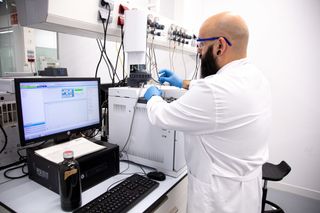
The BETA Technology Centre contributes significantly to making Central Catalonia a hub of knowledge and sustainability
The BETA Technology Centre not only is an international benchmark, but also plays a key role in the outreach of the UVic-UCC in Vic and in the region of Osona and Central Catalonia as a whole. The centre contributes significantly to making this region a hub of knowledge and sustainability that can attract international talent and bring it closer to local needs. Furthermore, it strengthens the region’s production sector, especially in relation to agri-food, with a firm commitment to sustainable development and competitiveness.
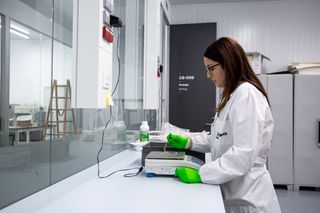
National and international projects
A member of the Network of TECNIO Centres of Catalonia since its inception, BETA Technology Centre participates every year in numerous national and international research projects, a third of which are coordinated by the centre. To date, it has participated in 62 European projects and over 20 national projects. It has also collaborated with over 50 companies, most of which are Catalan, in over 100 knowledge transfer projects.
Notably, the centre has links with government bodies, with which it has actively collaborated over the last ten years on several strategic projects. These include supporting the coordination of the Committee for Sustainable Livestock Management in Osona; drafting proposals for Catalonia's management plans for sewage sludge or digestate from biogas plants; promoting regional strategic projects, such as Osona Biocircular; advising local governments through the SIMIL Programme; and promoting the Catalan Nutrients Platform.
To date, BETA Technology Centre has participated in 62 European projects and over 20 national projects, and it has collaborated with over 50 companies in more than 100 knowledge transfer projects
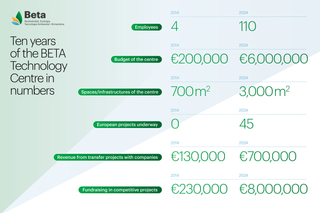
Sergio Ponsá, director of the BETA Technology Centre, explained that the raison d'être of this centre, made up of a multidisciplinary scientific team, is “to be a leading centre for the Catalan agri-food sector, which provides knowledge for the region, can understand its needs and develop projects that end up having a real impact.” Laia Llenas, assistant director of the centre, added that “the people in the BETA team are at the heart of the project, since without their motivation, involvement and work we would not have been able to get this far.”
Growth prospects
In these ten years, BETA Technology Centre has expanded its number of scientific units and areas of work, adapting to the needs of the various actors and sectors with which it works and considering various national and international political strategies. Furthermore, it has grown physically. Firstly, it moved to Can Baumann in July 2021, where it currently occupies 1,260 m2. In addition, since 2019 it has had 5,000 m2 of experimental fields, transferred by Vic City Council for agricultural trials, and work is currently underway to double this surface area. More spaces will soon be opened at the Can Baumann site; new facilities that will be added to the current ones and will have a surface of 1,700 m2 to house more offices and spaces for pilot plants.
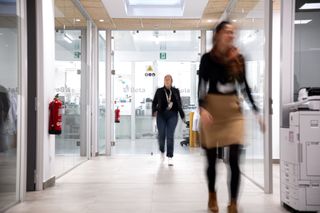
In addition, the BETA Technology Centre is working on entering new areas and other strategic points of the Catalan region, which will make it more competitive and increase its impact.
The centre has established a dynamic of collaboration with the BiBio research group of the Natural Sciences Museum of Granollers, which has so far made it possible to jointly promote and share some projects related to the study of biodiversity, the development of bioindicators and citizen science. "Strategically, this is an initiative of great value for the BETA Technology Centre, as it will open the door to other regions and initiatives, which will strengthen its commitment to work in the field of biodiversity and the impact of climate change from new spaces and areas of work,” stated Sergio Ponsá.
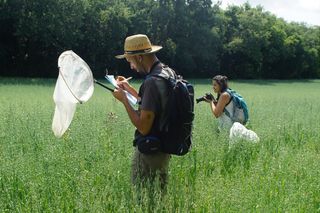
Furthermore, the centre has reached an agreement with the company Fertilizantes del Ebro (FERTIEBRO) and the Tervalis Group to have both offices and laboratories at the FERTIEBRO facilities in Soses (El Segrià). According to Laia Llenas, "this is a crucial step for the centre, since it will not only strengthen collaboration and strategic relations with a key fertiliser company in the Catalan area, but will also make it easier to start working more actively in the Lleida area; a region with challenges that are very similar to those of Central Catalonia.” Today, funding is already available for three European projects in the Lleida area (Balaguer, Menàrguens and Soses), which, Llenas assured, “will allow us to start establishing the bases of work in this region and will mean that BETA Technology Centre will initially have at least four full-time workers in Lleida.”
In addition, as part of its activity on the management and conservation of sea turtle nests in the western Mediterranean, the centre is working with Roses City Council to have its own space in this municipality in the near future. The possibility of having a space in Roses will help to better develop this line of work, through which the BETA Technology Centre provides a service and direct advice to local, national and European administrations on a very specific problem caused by global warming and its impact on the Mediterranean region.
Fields of expertise
Environmental Technologies and Circular Bioeconomy
Environmental technologies are at the core of the BETA Technology Centre’s research activities, which focus on the processing and recovery of solid, liquid and gas waste from various sources. BETA Technology Centre applies the concept of biorefinery, combining technologies to move towards zero waste processing.
Applied Ecology and Global Change
BETA Technology Centre works in this unit to understand how ecological processes can be used to develop innovative, nature-based solutions to address the adverse effects of global change, including climate change and anthropogenic impacts. This unit operates within the general framework of One Health.
Sustainable Agricultural and Food Systems
From a holistic perspective, the BETA Technology Centre works to increase the resilience of agricultural systems, develop strategies to adapt to and mitigate the impacts of climate change on agriculture, and promote the circular bioeconomy to ensure food security and improve soil health.
Accounting and Optimisation of Sustainability
The BETA Technology Centre develops and applies methodologies to assess the sustainability of complex systems, working on a scientific basis with environmental, economic and social indicators, and adopting a holistic perspective to understand the possible environmental consequences of alternative scenarios.
Green and Digital Transition
Through this unit, the BETA Technology Centre seeks to contribute to the green and digital transformation of the agri-food sector by developing web applications and other digital solutions that help the sector achieve its sustainability goals.
Governance for Sustainability
The BETA Technology Centre seeks to increase the impact of research and innovation at local, regional, European and international level, and to create synergies between all the agents involved, with a special focus on policy-makers involved in the development of new environmental policies.
Transfer, Regional and Sectoral Projects
This cross-cutting unit of the BETA Technology Centre works to promote the transfer of knowledge and innovation from the technology centre to actors in the agri-food sector, especially in the Catalan regions and including private companies and government bodies.
Biodiversity and Bioindication
This unit will be incorporated in 2025 in collaboration with the Granollers Museum of Natural Sciences, to promote knowledge of the state of nature. It will be based on a structure comprised of researchers and volunteers. BETA Technology Centre seeks efficiency in the application of this database in the management of the region.
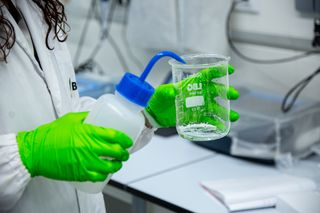
BETA Technology Centre as seen from within

Joan Colón Jordà, BETA Technology Centre researcher since 2014
"For me the BETA Technology Centre is a group success story, in which opportunity, enthusiasm, effort, the support of key people and even luck came together to build a leading project in the world of research and its ties to the region. After ten years of tireless work and going through good and bad times, it's nice to look back and remember how the project started: literally with four researchers, with barely more resources than the desire to carry out a life project and the conviction that doing science in another way was possible. Now it's time to look to the future with enthusiasm and excitement, with many challenges ahead and thinking about the new generations (both within BETA and outside of it), who will have to take a step forward to build the world we want and deserve."

Nagore Guerra Gorostegi, BETA Technology Centre researcher since 2016
"During eight years at the BETA Technology Centre, I have witnessed its growth and consolidation, with a structure based on the researchers’ knowledge and enhanced ability to address challenges from a very holistic perspective. Over this time, the evolution of the centre has been incredible: growth has allowed us to expand both the team and the facilities, giving us greater capacity to offer technological and strategic solutions for sustainable rural development and protection of the environment. We continue to work cohesively, in close collaboration with the agro-industrial sectors and with the firm aim of offering sustainable and significant solutions for society.”

Mercè Boy Roura, BETA Technology Centre researcher since 2017
“Few people could imagine when the BETA Technology Centre was created that it could grow so much, and so fast. The centre has been and is an example of the effort, motivation and considerable dedication of a group of young people (now maybe not so young anymore) who have found here an open door for opportunities to grow professionally and develop projects of all kinds. I would like to highlight the fact that BETA is close to my home, in Vic, in the Osona region, far from the big capitals, where centres like this are usually concentrated. For me, it is a pleasure to be able to work from Osona on research and innovation projects, participate in European projects, and on topics as relevant as sustainability and the circular economy, increasing the visibility of rural areas’ needs and providing solutions to some of the challenges of the region."

Lorenzo Proia, BETA Technology Centre researcher since 2018
"The six years at the BETA Technology Centre have radically and forever changed my vision of research and innovation, due to a model that has been able to irreversibly break the dynamics that I knew in the academic world. The greatest success of these years of the centre, in my opinion, has been remaining faithful to its firm commitment to offer young researchers a consolidated professional development opportunity in the field of research and innovation. This resounding success is even more relevant if you consider that it has only been possible with the enthusiasm, dedication and efforts of a small group of visionary researchers who have persevered to make this dream a reality. Despite the centre's exponential growth, the human team has managed to stay true to its values and its mission, which makes the future of the centre even more promising."

Mireia Aguilera Rodà, research manager at BETA Technology Centre since 2017
"For me, being part of this project as a research management professional has been an exciting challenge, which has enriched me in terms of learning and professional development, and given me tools to contribute effectively to the growth of this centre that means so much to us. Being part of this exponential growth has involved constantly adapting to management challenges that would normally unfold over the years, but which have allowed the entire team to learn continuously, with flexibility and resilience. Many of the professionals who form part of the centre today have grown together due to the BETA Technology Centre, and we are certain that we will continue to develop, driven by its dynamics. I am proud to have been part of the journey almost from the outset, when we all fitted around a single round table at lunchtime, sharing paellas on working Saturdays and celebrating every small success. These memories show me that BETA is much more than a research centre: it is a community of committed people working with a common dream.”